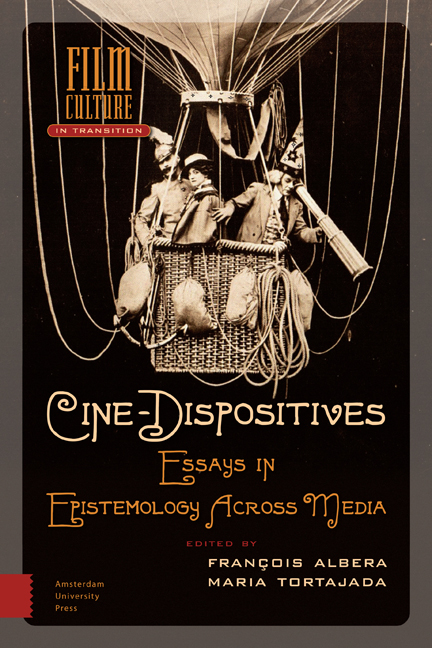Dispositive and Cinepoetry, around Foucault’s Death and the Labyrinth
Published online by Cambridge University Press: 10 February 2021
Summary
In a farcical piece titled “The Maldoror-Poems Dispositive,” Francis Ponge mockingly invites us to draw a use value from Lautréamont:
Open Lautréamont! And there you have literature turned inside out like an umbrella!
Close Lautréamont! And everything immediately falls back into place…
To enjoy complete intellectual comfort at home, try and adapt the MALDOROR/ POEMS dispositive to your library.
This 1946 text implicitly refers to the famous umbrella of The Songs of Maldoror, which reads: “as beautiful as the random encounter between an umbrella and a sewing machine upon a dissecting table.” Yet Ponge, dismissing the fantastic element, extracts a domestic technique, a procedure of mechanical standardization from the metaphor that served as a talisman for Surrealism. Since a similar procedure informed Ducasse's Poems, precisely, composed as they were through the systematic recasting of classical maxims by Pascal or Vauvenargues, the Maldoror-Poems dispositive likewise conceals a theoretical argument under its advertising patter: namely, that the poetry of Surrealism and its metaphorical fantasticality had come to an end by 1946, opening the way for the age of the “dispositive” in the postwar period. That culture had become a matter of home furnishing, and literature a matter of umbrellas, suggests that the intersection of the discursive and the non-discursive, designated by the dispositif according to Foucault, should be thought of in parodic mode. Indeed, starting in the 1950s, the material rhetoric of Ponge's objeu, and later the naturalism of language in the fabrique [“manufacture”] of Ponge's poem Le pré, inaugurated a genuine poetics of the “dispositif” in the poet's work.
This essay has its departure point in modern poetry, more specifically in the invention of experience by the poetic text. I will try and argue for the hypothesis that the genesis of the notion of the dispositive – with Foucault, but not only – as a network of relations between the discursive and the non-discursive, rested on a new understanding of the textual and the poetic tied to the emergence of cinema. More concisely, the condition of possibility for thinking the dispositive is the interweaving of cinema and poetic texts (cinepoetry). While I am not so concerned with the critical effectiveness of the notion of the dispositive of audio-vision, I do not mean to suggest that the dispositive is merely an effect of the text.
- Type
- Chapter
- Information
- Cine-DispositivesEssays in Epistemology Across Media, pp. 359 - 378Publisher: Amsterdam University PressPrint publication year: 2015

